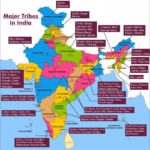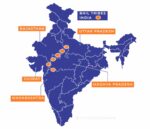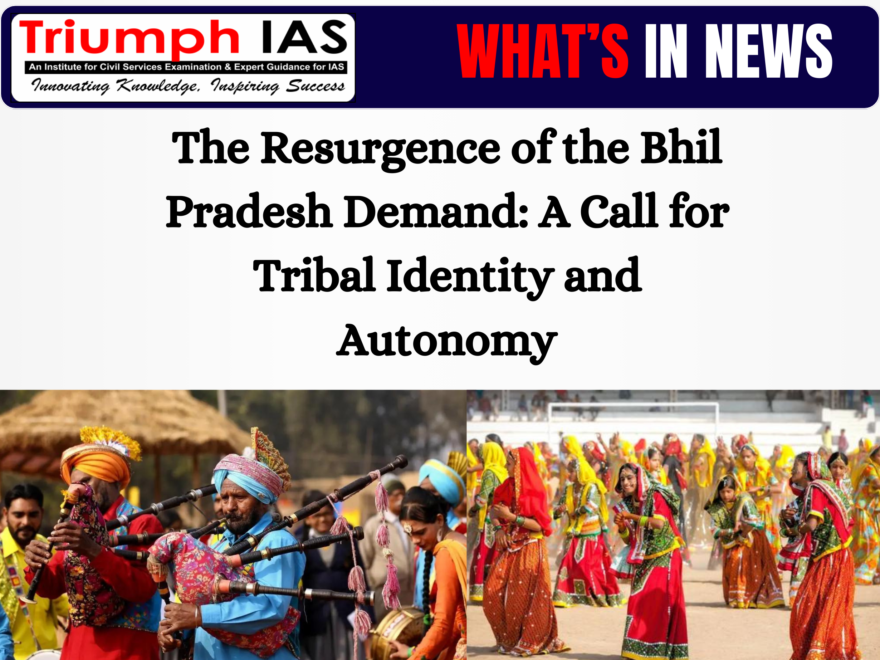The Resurgence of the Bhil Pradesh Demand: A Call for Tribal Identity and Autonomy
Why in News
Recently the demand for a separate state for the Bhil community, known as Bhil Pradesh, has resurfaced with renewed vigor in Rajasthan and neighbouring states. This movement, which has historical roots and contemporary political implications, highlights the complexities of tribal identity, governance, and the quest for autonomy in India.
Historical Context of the Bhil Pradesh Demand
The Bhil community, one of the largest tribal groups in India, has a rich history that intertwines with the socio-political landscape of western India. The demand for Bhil Pradesh can be traced back to the early 20th century, notably after the Mangarh massacre in 1913, where British forces killed hundreds of Bhil tribals. This tragic event is often referred to as the “Adivasi Jallianwala,” symbolizing the community’s struggle against colonial oppression and their quest for recognition and rights.

The call for a separate state gained momentum post-Independence, with various leaders advocating for the unification of tribal regions that were fragmented by political decisions. The Bhil community asserts that the division of their territories has hindered their ability to organize and advocate for their rights effectively. According to Dr. Velaram Ghogra, president of the Bharat Tribal Party (BTP), the historical context of tribal unity and the ongoing neglect of tribal issues by mainstream political parties fuel the demand for Bhil Pradesh today.
Current Political Landscape
Recently, a significant rally at Mangarh Dham saw thousands of Bhil tribals gather to reiterate their demand for Bhil Pradesh. Banswara’s Member of Parliament, Rajkumar Roat, emphasized that this demand is long overdue and plans to present it to the President and Prime Minister. The rally reflects a broader sentiment among the Bhil community, which feels marginalized in the current political framework dominated by larger parties like the BJP and Congress.
The formation of the Bharat Adivasi Party (BAP) in 2023, which has garnered substantial support, indicates a shift towards a more organized tribal political identity. With three MLAs and one MP, the BAP is positioning itself as a significant player in Rajasthan’s political arena, advocating for tribal rights and a distinct cultural identity separate from mainstream Hinduism. This shift is crucial as it signals a growing consolidation of tribal voices that have historically been sidelined.
Reasons Behind the Demand for Bhil Pradesh
The demand for a separate state arises from various socio-economic and political grievances experienced by the Bhil community:
– Political Marginalization: The Bhils feel that their interests are often overlooked by national parties, which have used tribal votes for political gain without addressing their specific needs. This has led to a sense of disillusionment with the existing political system.
– Cultural Identity: The BAP leaders assert a distinct tribal culture that they believe is incompatible with mainstream Hindu identity. They argue that their customs and traditions warrant recognition and respect, further justifying the need for a separate state.
– Developmental Concerns: Many tribal areas in Rajasthan suffer from underdevelopment and lack of access to basic services. The Bhil community believes that a separate state would allow for more focused governance and better implementation of welfare schemes designed for their benefit.
The Road Ahead: Challenges and Opportunities
While the demand for Bhil Pradesh has gained traction, it is not without challenges. The ruling BJP has expressed concerns about the implications of creating states based on caste or tribal identity, warning that such a move could lead to further divisions within society. This stance reflects a broader apprehension about the potential for fragmentation in a diverse nation like India.
However, the growing political mobilization of the Bhil community presents an opportunity for dialogue and negotiation. If the BAP and other tribal leaders can articulate their demands effectively, there is potential for a more inclusive approach to governance that acknowledges the unique needs of tribal populations.

 Conclusion
Conclusion
The resurgence of the demand for Bhil Pradesh is a significant development in Rajasthan’s political landscape, highlighting the ongoing struggle for tribal rights and identity. As the Bhil community continues to assert its voice, the implications for regional politics and governance will be profound. The coming months will be critical in determining whether this demand will translate into tangible political change or remain a rallying cry for a community seeking recognition and autonomy.The Bhil Pradesh movement is not just about territorial claims; it embodies a deeper quest for dignity, identity, and self-determination that resonates with many marginalized communities across India.
Sociology Optional Program for
UPSC CSE 2025 & 2026
Follow us :




One comment